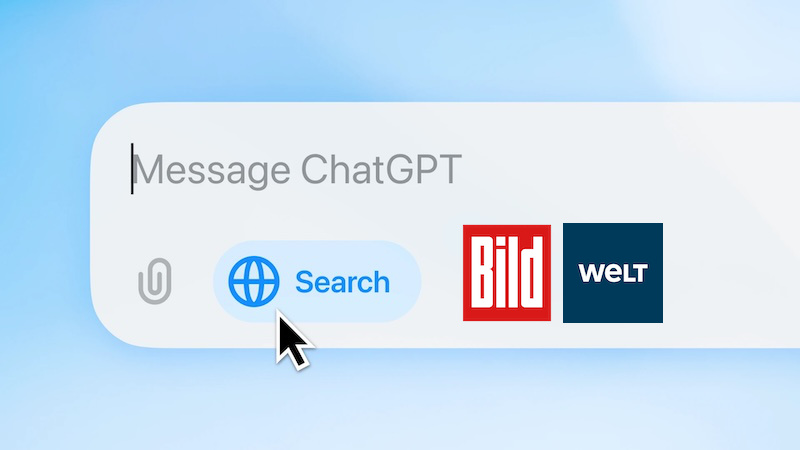
OpenAI has launched its own search engine. Many media outlets are overwhelmed with praise and are already calling for the end of Google and Co. A critical classification? None! One look at the sources is enough to determine: Search GPT is dubious! A comment.
With GPT Search, ChatGPT now has a search function. It is intended to compete with classic search engines. The problem: The search results are not only unbalanced, but also characterized by populism, sensational headlines and hate speech – and there is a reason for that.
Search GPT is not reputable – that’s why
In December 2023, OpenAI and Axel Springer Verlag entered into a global partnership. The self-declared goal: to strengthen “independent journalism” in the AI age. Since then, ChatGPT has been providing users with summaries of selected news content PICTURE, World, Business Insider and Politico.
Due to the integration of GPT Search, the language model now also contains sources and links. To ensure access to relevant information, Open AI has also partnered with other news and data providers, including Associated Press, Conde Nastthe Financial Times, Reuters and Le Monde.
These partnerships are intended to prevent legal disputes. But ChatGPT Search not only searches, processes, cites and links to the content of its media partners, but also other news websites. The collaborations appear questionable in this respect. Although the company emphasizes that the content is balanced, the reality tells a different story.
But what could possibly go wrong when Search GPT is overwhelmingly dominated by news websites whose business model is based on populism, sensationalist headlines, incitement and fear-mongering? We did a little test.
Search results from ChatGPT: IMAGE and world dominate
Our search queries including results (as of November 6, 2024):
- Prompt: “Looking for current information on the VW crisis”. Sources: World, AutoImage, World, AutoImage, AutoImage, ZDF
- Prompt: “Looking for current information on German asylum policy”. Sources: Federal Government, World, World, ZDF
- Prompt: “Look for current information about the US election”: Sources: PICTURE, PICTURE, WirtschaftsWoche, Wikipedia, The first
Admittedly, the source information is not so noticeably one-sided for all search queries. But balance definitely looks different. Regardless of whether it is politics, sport or society: ChatGPT’s search results are dominated by Springer media.
The language model therefore spreads content that actively contributes to the division of society by using narratives. That’s how it is PICTURE for example, the newspaper with the most complaints from the Press Council, while the World appears regularly with campaign journalism – and sometimes even promotes conspiracy theories.
Since the release of ChatGPT, there has also been an increasing impression that numerous media outlets are praising everything that developer company OpenAI creates. True to the motto: “PICTURE of your opinion”. That’s why it’s all the more important to actively deal with the topic of AI and to look at Search GPT critically – not to mention regulation.
A notice: This article is a commentary. This is a journalistic form of presentationwhich explicitly reflects the opinion of the author and not the entire magazine. The comment does not claim to be objective, but is intended to stimulate the formation of opinions and is considered an opinion piece Article 5 protected by the Basic Law.
Also interesting:
- Utopian punishment for Google: German media as Russia’s stirrup holder
- “Violation of fundamental rights”: LinkedIn is said to have misused user data for advertising
- Data processing: ECJ ruling could revolutionize the entire advertising industry
- With ECG data: This AI should be able to predict death
The article Sources from Search GPT: OpenAI’s AI search is absolutely dubious! by Fabian Peters first appeared on BASIC thinking. Follow us too Facebook, Twitter and Instagram.
As a Tech Industry expert, I have concerns about the sources of search results generated by OpenAI’s GPT technology. While GPT has shown impressive capabilities in generating human-like text, the reliability and accuracy of the information it provides are questionable.
The AI search engine may not have access to the most up-to-date or trustworthy sources of information, leading to potentially biased or misleading search results. Additionally, the lack of transparency in how the AI selects and prioritizes sources raises concerns about the credibility of the information it presents to users.
Furthermore, the potential for manipulation of search results by bad actors cannot be ignored, as the AI may not have the ability to discern between credible sources and misinformation.
As a result, it is crucial for users to approach search results generated by GPT with caution and skepticism, and to verify information from multiple reputable sources before making decisions based on the AI’s recommendations. Additionally, OpenAI must prioritize transparency and accountability in how its AI search technology operates to ensure the integrity of the information it provides to users.
Credits